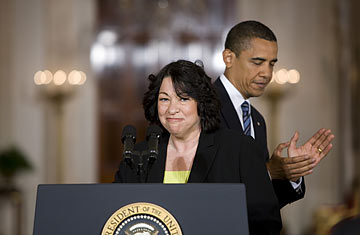
President Barack Obama applauds federal appeals court judge Sonia Sotomayor, his nominee for the Supreme Court, in the East Room of the White House in Washington.
So why did Sonia Sotomayor get the nod as Barack Obama's first pick for the Supreme Court? Of the four women in final contention for the job — the competition included two members of his Administration, Solicitor General Elena Kagan and Homeland Security Secretary Janet Napolitano as well as his fellow Chicagoan, Appeals Court Judge Diane P. Wood — Sotomayor was the candidate with whom the President was least familiar. But Sotomayor aced an hour-long interview with the President last Thursday at the White House, an official there says. "She is in many ways the combination of the experience and strong intellect he's looking for, as well as the personal life experience to bring to the court something it has never had before."
It also didn't hurt that she's been through the Senate confirmation process twice before — as George H.W. Bush's nominee to the Southern District Court of New York in 1992 and Bill Clinton's to the U.S. Court of Appeals for the Second Circuit in 1998. The White House official notes that Orrin Hatch — the senior Republican on the Senate Judiciary Committee as well as the chamber's most influential GOP voice on judicial nominations — voted for Sotomayor both times. (See TIME's photo-essay on Sotomayor's Supreme Court nomination.)
The fact that she is the first Hispanic nominee will put Republicans who wish to oppose her in a difficult political spot, given the 9-percentage-point decline the party suffered in Hispanic support in the 2008 presidential election. "It presents a huge political problem for them," says the White House official. "It's not the reason she got the job — but it's not a bad thing. They need to tread carefully here, and their groups are not going to want to tread carefully."
Indeed, a fight is a political inevitability. More than an hour before her nomination became official, Sotomayor had already been branded a "liberal judicial activist of the first order" by the conservative Judicial Confirmation Network. Said Wendy Long, counsel to the organization: "She has an extremely high rate of her decisions being reversed, indicating that she is far more of a liberal activist than even the current liberal activist Supreme Court." (See four myths about Supreme Court nominees.)
But there are those in the White House who think that any politicization of the process could backfire over a summer when Obama is trying to get so much else done, including health-care reform. While interest groups on both the right and left care passionately about court nominations, this is not one that is likely to tip the balance of the court in either direction when it comes to hot-button social issues like abortion. That means, for most Americans, Sotomayor's nomination will remain secondary to other issues, like fixing the economy. And those who fight over it will seem needlessly partisan. (Read "Judge Sonia Sotomayor Headed for Easy Supreme Court Nomination.")
Of course, the judicial-confirmation process can take surprising turns, as Senators delve more deeply into the background of a nominee. (Perhaps you've heard of Clarence Thomas?) Which is why Senate Republicans want to give this one a lot of time. "We will thoroughly examine her record to ensure she understands that the role of a jurist in our democracy is to apply the law evenhandedly, despite their own feelings or personal or political preferences," Senate minority leader Mitch McConnell said in a statement that could be read as cautious or ominous. "Our Democratic colleagues have often remarked that the Senate is not a 'rubber stamp.' Accordingly, we trust they will ensure there is adequate time to prepare for this nomination, and a full and fair opportunity to question the nominee and debate her qualifications."
